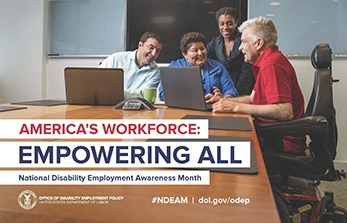Employment has the ability to make you feel like a contributing member of society; the right job has the ability to make you feel generally happy. Because of the importance of employment for all people, including those with disabilities, National Disability Employment Awareness Month is recognized in October. However, for about 60 percent of those who acquire a brain injury, starting or returning to work does not occur. For a variety of reasons, they remain unemployed, a status that promotes such things as depression, already a symptom of brain injury.
The government recognizes this issue, as, if nothing else, it results in fewer taxes paid and more government monetary benefits provided. Perhaps because of this, but most likely not wholly for this reason, they have funded multiple studies related to employment following brain injury. After years of study that seem to have concentrated on the neurological and medical difficulty of returning to work for individuals after a brain injury, in 2016 the NIH focused on the employers and completed a study that concluded, “stigma and discrimination in mental health conditions may have an impact on expectations of RTW [return to work], and on RTW outcomes.”
Since this discovery from the NIH, which may be all too obvious to many brain injury survivors, government study has continued. However, from what I can determine, these new studies again focus on the capabilities of those with brain injury, not on the behavior and practices of employers. In a small 2017 study entitled Opportunities and barriers for successful return to work after acquired brain injury: a patient perspective, “the aim was to increase knowledge of opportunities and barriers for a successful return to work in patients with [acquired brain injury].” It focused on the need for individually adapted rehabilitation, survivor motivation to return to work and the survivor’s cognitive and social abilities.
Again looking at the abilities of the survivor/jobseeker, this time through medical scans and evaluation, recently a government-funded study by the Kessler Foundation was published: Impact of frontal neurobehavioral symptoms on employment individuals with TBI. The frontal lobes of the brain are the short-term memory storage sites, direct the motor area [voluntary movement], allow the brain to transfer thoughts into words, among other important things. “Our results indicate that frontal neurobehavioral symptoms may be predictive of the ability to achieve and maintain employment after TBI… Developing rehabilitative strategies that address these behaviors could improve employment outcomes.” While Kessler’s conclusion may be important, taking action on the 2016 NIH findings seems just as, if not more, important. The opportunity for meaningful employment must be there before someone can determine if they are capable of pursuing it.
(The above picture is the official Department of Labor poster for 2018 NDEAM.)

